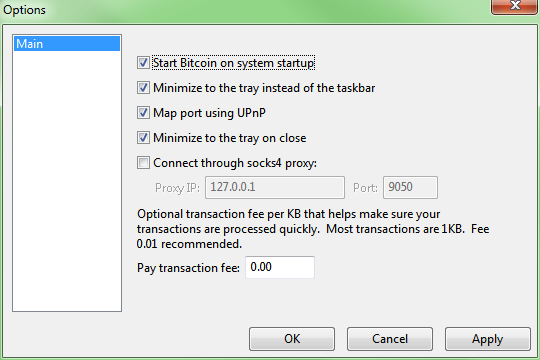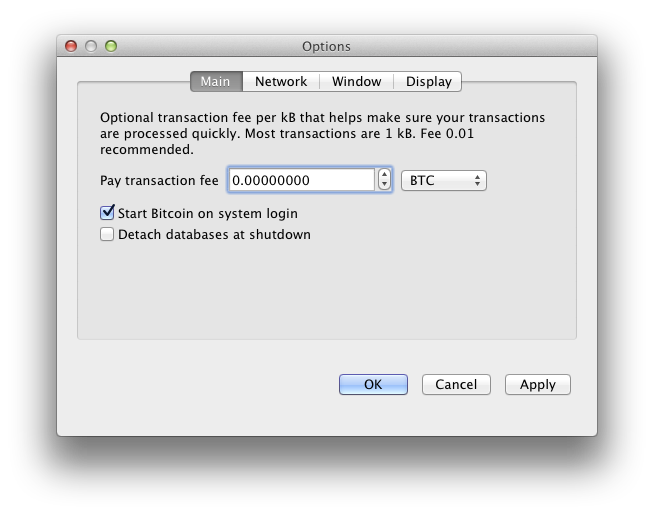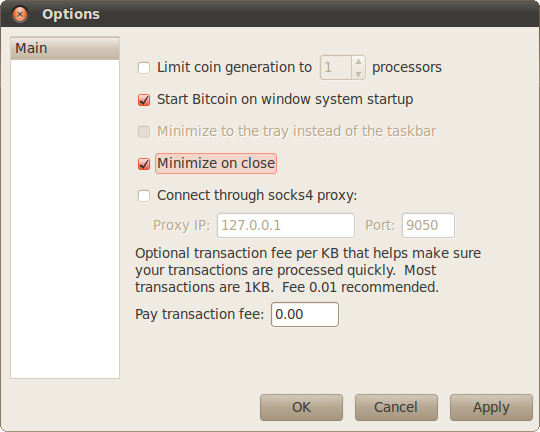Running Bitcoin
There are two variations of the original bitcoin program available; one with a graphical user interface (usually referred to as just “Bitcoin”), and a 'headless' version (called bitcoind). They are completely compatible with each other, and take the same command-line arguments, read the same configuration file, and read and write the same data files. You can run one copy of either Bitcoin or bitcoind on your system at a time (if you accidently try to launch another, the copy will let you know that Bitcoin or bitcoind is already running and will exit).
Linux Quickstart
The simplest way to start from scratch with the command line client, automatically syncing blockchain and creating a wallet, is to just run this command (without arguments) from the directory containing your bitcoind binary:
./bitcoind
To run with the standard GUI interface:
./bitcoin-qt
Command-line arguments
Give bitcoind the -? or –-help argument and it will print out a list of the most commonly used command-line arguments and then exit:
Bitcoin Core Daemon version v0.10.2
Usage:
bitcoind [options] Start Bitcoin Core Daemon
Options:
-? This help message
-alertnotify=<cmd> Execute command when a relevant alert is received or we see a really long fork (%s in cmd is replaced by message)
-blocknotify=<cmd> Execute command when the best block changes (%s in cmd is replaced by block hash)
-checkblocks=<n> How many blocks to check at startup (default: 288, 0 = all)
-checklevel=<n> How thorough the block verification of -checkblocks is (0-4, default: 3)
-conf=<file> Specify configuration file (default: bitcoin.conf)
-daemon Run in the background as a daemon and accept commands
-datadir=<dir> Specify data directory
-dbcache=<n> Set database cache size in megabytes (4 to 1024, default: 100)
-loadblock=<file> Imports blocks from external blk000??.dat file on startup
-maxorphantx=<n> Keep at most <n> unconnectable transactions in memory (default: 100)
-par=<n> Set the number of script verification threads (-32 to 16, 0 = auto, <0 = leave that many cores free, default: 0)
-pid=<file> Specify pid file (default: bitcoind.pid)
-reindex Rebuild block chain index from current blk000??.dat files on startup
-sysperms Create new files with system default permissions, instead of umask 077 (only effective with disabled wallet functionality)
-txindex Maintain a full transaction index, used by the getrawtransaction rpc call (default: 0)
-prune=<n> Reduce storage requirements by pruning (deleting) old blocks(default: 0 =
disable pruning blocks, >550 = target size in MiB to use for block
files)
Connection options:
-addnode=<ip> Add a node to connect to and attempt to keep the connection open
-banscore=<n> Threshold for disconnecting misbehaving peers (default: 100)
-bantime=<n> Number of seconds to keep misbehaving peers from reconnecting (default: 86400)
-bind=<addr> Bind to given address and always listen on it. Use [host]:port notation for IPv6
-connect=<ip> Connect only to the specified node(s)
-discover Discover own IP address (default: 1 when listening and no -externalip)
-dns Allow DNS lookups for -addnode, -seednode and -connect (default: 1)
-dnsseed Query for peer addresses via DNS lookup, if low on addresses (default: 1 unless -connect)
-externalip=<ip> Specify your own public address
-forcednsseed Always query for peer addresses via DNS lookup (default: 0)
-listen Accept connections from outside (default: 1 if no -proxy or -connect)
-maxconnections=<n> Maintain at most <n> connections to peers (default: 125)
-maxreceivebuffer=<n> Maximum per-connection receive buffer, <n>*1000 bytes (default: 5000)
-maxsendbuffer=<n> Maximum per-connection send buffer, <n>*1000 bytes (default: 1000)
-onion=<ip:port> Use separate SOCKS5 proxy to reach peers via Tor hidden services (default: -proxy)
-onlynet=<net> Only connect to nodes in network <net> (ipv4, ipv6 or onion)
-permitbaremultisig Relay non-P2SH multisig (default: 1)
-port=<port> Listen for connections on <port> (default: 8333 or testnet: 18333)
-proxy=<ip:port> Connect through SOCKS5 proxy
-seednode=<ip> Connect to a node to retrieve peer addresses, and disconnect
-timeout=<n> Specify connection timeout in milliseconds (minimum: 1, default: 5000)
-whitebind=<addr> Bind to given address and whitelist peers connecting to it. Use [host]:port notation for IPv6
-whitelist=<netmask> Whitelist peers connecting from the given netmask or IP address. Can be specified multiple times.
Whitelisted peers cannot be DoS banned and their transactions are always relayed, even if they are already in the mempool, useful e.g. for a gateway
Wallet options:
-disablewallet Do not load the wallet and disable wallet RPC calls
-keypool=<n> Set key pool size to <n> (default: 100)
-paytxfee=<amt> Fee (in BTC/kB) to add to transactions you send (default: 0.00)
-rescan Rescan the block chain for missing wallet transactions on startup
-salvagewallet Attempt to recover private keys from a corrupt wallet.dat on startup
-sendfreetransactions Send transactions as zero-fee transactions if possible (default: 0)
-spendzeroconfchange Spend unconfirmed change when sending transactions (default: 1)
-txconfirmtarget=<n> If paytxfee is not set, include enough fee so transactions begin confirmation on average within n blocks (default: 2)
-maxtxfee=<amt> Maximum total fees to use in a single wallet transaction, setting too low may abort large transactions (default: 0.10)
-upgradewallet Upgrade wallet to latest format on startup
-walletbroadcast=<n> Automatic transaction broadcast and rebroadcast (default=1)
-wallet=<file> Specify wallet file (within data directory) (default: wallet.dat)
-walletnotify=<cmd> Execute command when a wallet transaction changes (%s in cmd is replaced by TxID)
-zapwallettxes=<mode> Delete all wallet transactions and only recover those parts of the blockchain through -rescan on startup
(1 = keep tx meta data e.g. account owner and payment request information, 2 = drop tx meta data)
Debugging/Testing options:
-debug=<category> Output debugging information (default: 0, supplying <category> is optional)
If <category> is not supplied, output all debugging information.
<category> can be: addrman, alert, bench, coindb, db, lock, rand, rpc, selectcoins, mempool, net.
-gen Generate coins (default: 0)
-genproclimit=<n> Set the number of threads for coin generation if enabled (-1 = all cores, default: 1)
-help-debug Show all debugging options (usage: --help -help-debug)
-logips Include IP addresses in debug output (default: 0)
-logtimestamps Prepend debug output with timestamp (default: 1)
-printtoconsole Send trace/debug info to console instead of debug.log file
-shrinkdebugfile Shrink debug.log file on client startup (default: 1 when no -debug)
-testnet Use the test network
Node relay options:
-minrelaytxfee=<amt> Fees smaller than this (in satoshi) are considered zero fee (relaying and mining) (default: 0.00001) -limitfreerelay=<n> Rate-limit free transactions to <n>*1000 bytes per minute (default: 15) -datacarrier Relay and mine data carrier transactions (default: 1) -datacarriersize Maximum size of data in data carrier transactions we relay and mine (default: 40)
Block creation options:
-blockminsize=<n> Set minimum block size in bytes (default: 0) -blockmaxsize=<n> Set maximum block size in bytes (default: 750000) -blockprioritysize=<n> Set maximum size of high-priority/low-fee transactions in bytes (default: 50000)
RPC server options:
-server Accept command line and JSON-RPC commands -rest Accept public REST requests (default: 0) -rpcbind=<addr> Bind to given address to listen for JSON-RPC connections. Use [host]:port notation for IPv6. This option can be specified multiple times (default: bind to all interfaces) -rpcuser=<user> Username for JSON-RPC connections -rpcpassword=<pw> Password for JSON-RPC connections -rpcport=<port> Listen for JSON-RPC connections on <port> (default: 8332 or testnet: 18332) -rpcallowip=<ip> Allow JSON-RPC connections from specified source. Valid for <ip> are a single IP (e.g. 1.2.3.4), a network/netmask (e.g. 1.2.3.4/255.255.255.0) or a network/CIDR (e.g. 1.2.3.4/24). This option can be specified multiple times -rpcthreads=<n> Set the number of threads to service RPC calls (default: 4) -rpckeepalive RPC support for HTTP persistent connections (default: 1)
RPC SSL options: (has been removed as of upcoming v0.12)
-rpcssl Use OpenSSL (https) for JSON-RPC connections -rpcsslcertificatechainfile=<file.cert> Server certificate file (default: server.cert) -rpcsslprivatekeyfile=<file.pem> Server private key (default: server.pem) -rpcsslciphers=<ciphers> Acceptable ciphers (default: TLSv1.2+HIGH:TLSv1+HIGH:!SSLv2:!aNULL:!eNULL:!3DES:@STRENGTH)
Many of the boolean options can also be set to off by specifying them with a "no" prefix: e.g. -nodnseed.
Bitcoin.conf Configuration File
All command-line options (except for -conf) may be specified in a configuration file, and all configuration file options may also be specified on the command line. Command-line options override values set in the configuration file.
The configuration file is a list of setting=value pairs, one per line, with optional comments starting with the '#' character.
The configuration file is not automatically created; you can create it using your favorite plain-text editor. By default, Bitcoin (or bitcoind) will look for a file named 'bitcoin.conf' in the bitcoin data directory, but both the data directory and the configuration file path may be changed using the -datadir and -conf command-line arguments.
| Operating System | Default bitcoin datadir | Typical path to configuration file |
|---|---|---|
| Windows | %APPDATA%\Bitcoin\ | C:\Users\username\AppData\Roaming\Bitcoin\bitcoin.conf |
| Linux | $HOME/.bitcoin/ | /home/username/.bitcoin/bitcoin.conf |
| Mac OSX | $HOME/Library/Application Support/Bitcoin/ | /Users/username/Library/Application Support/Bitcoin/bitcoin.conf |
Note: if running Bitcoin in testnet mode, the sub-folder "testnet" will be appended to the data directory automatically.
Sample Bitcoin.conf
Here is a sample bitcoin.conf file.
# bitcoin.conf configuration file. Lines beginning with # are comments. # Network-related settings: # Run on the test network instead of the real bitcoin network. #testnet=0 # Connect via a socks4 proxy #proxy=127.0.0.1:9050 ############################################################## ## Quick Primer on addnode vs connect ## ## Let's say for instance you use addnode=4.2.2.4 ## ## addnode will connect you to and tell you about the ## ## nodes connected to 4.2.2.4. In addition it will tell ## ## the other nodes connected to it that you exist so ## ## they can connect to you. ## ## connect will not do the above when you 'connect' to it. ## ## It will *only* connect you to 4.2.2.4 and no one else.## ## ## ## So if you're behind a firewall, or have other problems ## ## finding nodes, add some using 'addnode'. ## ## ## ## If you want to stay private, use 'connect' to only ## ## connect to "trusted" nodes. ## ## ## ## If you run multiple nodes on a LAN, there's no need for ## ## all of them to open lots of connections. Instead ## ## 'connect' them all to one node that is port forwarded ## ## and has lots of connections. ## ## Thanks goes to [Noodle] on Freenode. ## ############################################################## # Use as many addnode= settings as you like to connect to specific peers #addnode=69.164.218.197 #addnode=10.0.0.2:8333 # ... or use as many connect= settings as you like to connect ONLY # to specific peers: #connect=69.164.218.197 #connect=10.0.0.1:8333 # Maximum number of inbound+outbound connections. #maxconnections= # JSON-RPC options (for controlling a running Bitcoin/bitcoind process) # server=1 tells Bitcoin-QT to accept JSON-RPC commands. #server=0 # You must set rpcuser and rpcpassword to secure the JSON-RPC api #rpcuser=Ulysseys #rpcpassword=random_authvalue_DO_NOT_USE_THIS_STRING_OR_YOU_WILL_GET_ROBBED._USE_THE_ONE_BITCOIND_RECOMMENDS_WHEN_RUN_WITHOUT_ONE_SET_385593 # How many seconds bitcoin will wait for a complete RPC HTTP request. # after the HTTP connection is established. #rpctimeout=30 # By default, only RPC connections from localhost are allowed. Specify # as many rpcallowip= settings as you like to allow connections from # other hosts. As of Bitcoin Core 0.10.0, wildcards are no longer allowed. Use one of the sample forms below. # NOTE: opening up the RPC port to hosts outside your local # trusted network is NOT RECOMMENDED, because the rpcpassword # is transmitted over the network unencrypted. #rpcallowip=10.1.1.34 #rpcallowip=192.168.1.0/255.255.255.0 #rpcallowip=172.16.0.0/24 # Listen for RPC connections on this TCP port: #rpcport=8332 # You can use Bitcoin or bitcoind to send commands to Bitcoin/bitcoind # running on another host using this option: #rpcconnect=127.0.0.1 # Use Secure Sockets Layer (also known as TLS or HTTPS) to communicate # with Bitcoin -server or bitcoind #rpcssl=1 # OpenSSL settings used when rpcssl=1 #rpcsslciphers=TLSv1+HIGH:!SSLv2:!aNULL:!eNULL:!AH:!3DES:@STRENGTH #rpcsslcertificatechainfile=server.cert #rpcsslprivatekeyfile=server.pem # Miscellaneous options # Set gen=1 to attempt to generate bitcoins #gen=0 # Pre-generate this many public/private key pairs, so wallet backups will be valid for # both prior transactions and several dozen future transactions. #keypool=100 # Pay an optional transaction fee every time you send bitcoins. Transactions with fees # are more likely than free transactions to be included in generated blocks, so may # be validated sooner. #paytxfee=0.00 # Allow direct connections for the 'pay via IP address' feature. #allowreceivebyip=1 # User interface options # Start Bitcoin minimized #min=1 # Minimize to the system tray #minimizetotray=1
Platforms
Windows
Start automatically
To configure the Bitcoin client to start automatically:
You might use the configuration-file, or the GUI-Settings:
Settings -> Options
then mark the checkbox titled:
[X] Start Bitcoin on system startup
Batch automation
To work with batch, you have to start the daemon (bitcoind.exe). The bitcoin.exe run with option "-server" will respond with GUI-messages you are not able to process its answers.
Mac
Linux
See Also
| |||||||||||


